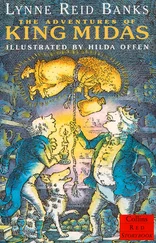Glyn Iliffe - King of Ithaca (Adventures of Odysseus)
Здесь есть возможность читать онлайн «Glyn Iliffe - King of Ithaca (Adventures of Odysseus)» весь текст электронной книги совершенно бесплатно (целиком полную версию без сокращений). В некоторых случаях можно слушать аудио, скачать через торрент в формате fb2 и присутствует краткое содержание. Год выпуска: 2009, ISBN: 2009, Издательство: Macmillan Publishers UK, Жанр: Старинная литература, на английском языке. Описание произведения, (предисловие) а так же отзывы посетителей доступны на портале библиотеки ЛибКат.
- Название:King of Ithaca (Adventures of Odysseus)
- Автор:
- Издательство:Macmillan Publishers UK
- Жанр:
- Год:2009
- ISBN:9780230744486
- Рейтинг книги:3 / 5. Голосов: 1
-
Избранное:Добавить в избранное
- Отзывы:
-
Ваша оценка:
- 60
- 1
- 2
- 3
- 4
- 5
King of Ithaca (Adventures of Odysseus): краткое содержание, описание и аннотация
Предлагаем к чтению аннотацию, описание, краткое содержание или предисловие (зависит от того, что написал сам автор книги «King of Ithaca (Adventures of Odysseus)»). Если вы не нашли необходимую информацию о книге — напишите в комментариях, мы постараемся отыскать её.
King of Ithaca (Adventures of Odysseus) — читать онлайн бесплатно полную книгу (весь текст) целиком
Ниже представлен текст книги, разбитый по страницам. Система сохранения места последней прочитанной страницы, позволяет с удобством читать онлайн бесплатно книгу «King of Ithaca (Adventures of Odysseus)», без необходимости каждый раз заново искать на чём Вы остановились. Поставьте закладку, и сможете в любой момент перейти на страницу, на которой закончили чтение.
Интервал:
Закладка:
On Tyndareus’s right was Icarius, who smiled briefly and without warmth at the new arrival. Next to him sat Diomedes, the Argive prince who had recently destroyed the city of Thebes. Like Agamemnon’s, his hair was long and brown with a hint of red, but unlike the Mycenaean he did not hide his good looks behind a beard, leaving his strong jaw clean-shaven. His clothes were expensive but not showy, unlike most others gathered in the group, and despite his handsome appearance he had an aggressive, hard-bitten mien that Odysseus approved of. A long pink scar stood out on his tanned cheek, running from the top of his ear down across his jawline. He acknowledged Odysseus with a nod before beckoning to a slave for more wine.
‘Aren’t these islands you name in the Ionian Sea?’ asked a short, black-haired man with a pinched nose and small black eyes. ‘Full of rocks and sheep and little else, I’m told.’
Palamedes laughed at his own sally and looked about at the others, laughing at each one in turn until their silence quietened him.
‘Yes, there are rocks and sheep,’ Odysseus answered. ‘Rocks and sheep, sea and fish, flowers and women, homes and families. We left all these things many days ago to witness the glory of Sparta and marvel at its most blessed child. But our journey hasn’t been easy.’
And so he told the kings and princes of the hardships he and his men had faced in reaching Sparta. His voice was calm and smooth, instantly washing over them and stilling their minds. Those that were already talking fell silent and turned their heads towards him, quickly forgetting their own adventures in the boar hunt as the other sounds in the great hall faded and they heard only his words. He spoke passionately of the river, of Mentor and the news from Ithaca, of the burning trees, the battle with the Taphians, the slaying of the serpent, the death of Polybus and the meeting with Iphitus. Only one thing remained unmentioned, but Odysseus was clever enough not to make reference to his patron goddess or the things she had told him. It was enough that these men knew of his country’s plight without him having to plead its cause like a beggar.
His words commanded their silence, though there were occasional grunts of approval or noises of disgust as each event was unfolded before them. At the mention of Laertes’s throne being forcibly taken from him there was even an angry murmur, but when Odysseus had ended his tale at the Taygetus Mountains, looking down over the Eurotas valley, there was no more mention of the subject. Odysseus was not disappointed. He understood that the nobility of Greece were no ordinary audience; when they spoke, lives were changed, and so they knew when to reserve their comments and when to voice them.
‘You impress me, Odysseus,’ Tyndareus said. ‘You’re a worthy suitor, even amongst such men as these. And you have my sympathies for the loss of your father’s throne, which is your birthright.’
More food and wine were brought by the slaves and, with Odysseus’s tale finished, the noise of the feast swept back in on them like a wave. Agamemnon leaned towards Odysseus.
‘You seem like a resourceful man, friend, and not without your share of protection from the immortals. Perhaps we can test your judgement also: will you settle a small debate for us?’
‘If I’m able.’
‘Good. We were discussing the question of continued peace between Greek states.’
‘Peace?’ Odysseus replied, as if the word was new to him. ‘How can there be peace when the Epigoni are making war on Thebes?’
‘The war is over,’ said Diomedes. ‘We defeated them and took their city. Our fathers have been avenged and now there is peace.’
Odysseus looked at the scar-faced warrior, who had a clear sense of honour to his father and showed a warrior’s pride in his achievements. ‘It’s a privilege to meet the son of Tydeus, whose fame threatens that of his own sire. And I thank you for making my point for me. Have you asked yourselves when this cycle will stop? Won’t the next generation of Thebans want revenge for their dead fathers? Doesn’t each of us have family feuds that began before the times of our grandfathers? I’ve heard that even Agamemnon and Menelaus seek the death of Aegisthus for murdering their father. This is the barrier to peace amongst our states. We’re so busy avenging the transgressions caused against our forefathers that we’ll never be able to live side by side ourselves. Greece is held back by the grudges of its warrior families.’
‘What did I tell you?’ boomed Tyndareus, triumphantly. ‘Hey, Agamemnon? And you, Diomedes, echoing all this talk of unity across Greece. It’s a nonsense, and you know it.’
‘I didn’t say it was nonsense, my lord,’ Odysseus added carefully, taking a krater of wine from a passing slave. ‘Warriors have always fought whomever they chose, and our fathers made their fortunes and their names by the spear and the sword. Yet the times are changing. Trade flourishes throughout Greece and across the seas to other nations, and it seems to me that the era of military expansion is being replaced by a time of consolidation. Our enemies are now our neighbours, whether we like it or not.’
‘So will there be peace, even with the feuding?’ asked Menelaus. He was a young, well-built man with red-brown hair, thinning on top, and a black beard. His pale face was authoritative but kind, and yet his brow was furrowed as he addressed Odysseus. ‘I for one will never forgive my cousin for killing my father, even if my brother could countenance it. It dishonours my family and it dishonours me.’
‘That’s a question for yourself, Menelaus,’ Odysseus answered. ‘But for me, I think there is one thing that could bring the Greeks together.’
Agamemnon folded his hands in his lap and retreated behind his neutral, unimpassioned look. ‘What’s that?’
Odysseus did not answer immediately, but picked up a slice of boar from the platter in front of him and crammed it into his mouth. He chewed it and washed it down with wine before looking into the cold blue eyes of Agamemnon.
‘A mutual enemy will unite Greece. We share a common tongue and follow the same gods as each other, so what Greece needs is an outsider who doesn’t. Any gibberish-talking foreigner who gives us a reason to fight would suffice. That and an oath between kings, the most sacred and binding oath ever taken.’

The Spartan wine was strong and had already worked its way to Eperitus’s head. All around him his companions were adding their own noise to the general cacophony as the wine oiled their tongues. Hard-worked slaves brought them a constant supply of meat and drink, and with much-tested patience did little more than grin or nod apathetically at the drunken suggestions and comments that were offered them. The women in particular had grown used to the lewd attentions of the hundreds of men in the palace; they smiled and flirted their way free of their embraces and like a mountain breeze were heading back to the kitchens, larders or wine cellars before the soldiers knew it.
They were soon engaged by the group of warriors next to them, who came from Lindos on the island of Rhodes. They were fascinated with the tales of the Ithacans’ adventures, and sympathetic to the point of anger when they told them their king had been overthrown in their absence. It was an outrage to them that Ithaca, a place they had never heard of before, should be ruled by foreign invaders. Being islanders themselves, they understood what it was like to have a border set by the sea, where the sense of belonging to a homeland was so much stronger. From that point on they adopted the exiled Ithacans as their own, and both parties sought each other every night in the great hall throughout the months they remained in Sparta.
Читать дальшеИнтервал:
Закладка:
Похожие книги на «King of Ithaca (Adventures of Odysseus)»
Представляем Вашему вниманию похожие книги на «King of Ithaca (Adventures of Odysseus)» списком для выбора. Мы отобрали схожую по названию и смыслу литературу в надежде предоставить читателям больше вариантов отыскать новые, интересные, ещё непрочитанные произведения.
Обсуждение, отзывы о книге «King of Ithaca (Adventures of Odysseus)» и просто собственные мнения читателей. Оставьте ваши комментарии, напишите, что Вы думаете о произведении, его смысле или главных героях. Укажите что конкретно понравилось, а что нет, и почему Вы так считаете.










